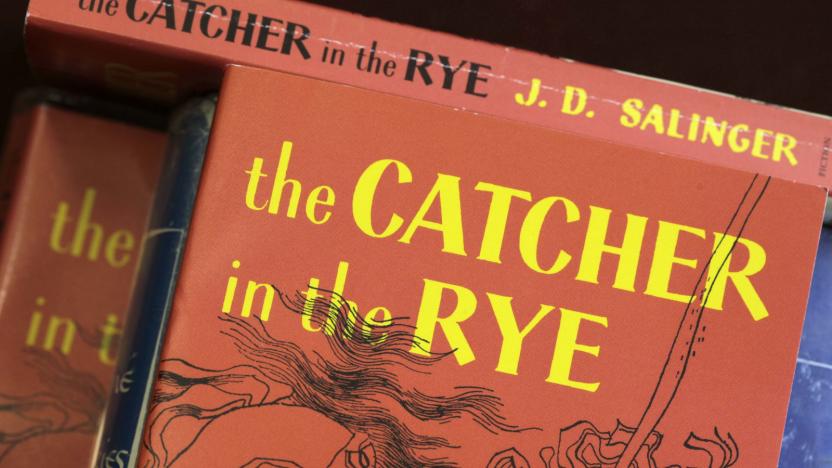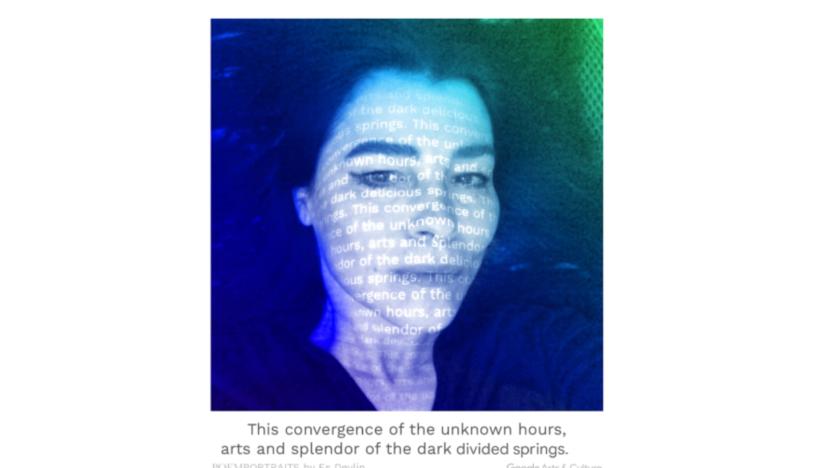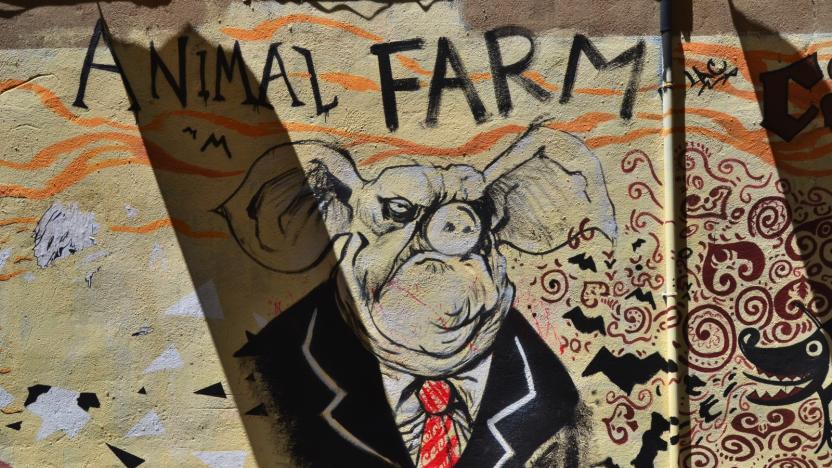literature
Latest

Amazon's Kindle Vella episodic story platform to launch in July
Amazon has announced a new serialized fiction store called Kindle Vella, which lets users buy and interact with episodic stories using in-app credits.

AI avatars of Chinese authors could soon narrate audiobooks
The Chinese search engine Sogou isn't stopping at AI news anchors. The company has created "lifelike" avatars of two Chinese authors, and it plans to have them narrate audiobooks in video recordings. According to the BBC, Sogou used AI, text-to-speech technology and video clips from the China Online Literature+ conference to create avatars of authors Yue Guan and Bu Xin Tian Shang Diao Xian Bing.

J.D. Salinger novels will finally be released as e-books
It's not just musicians giving in to demand to go digital. J.D. Salinger's son Matt has agreed to publish e-book versions of the famed author's novels, including The Catcher in the Rye and Franny and Zooey, later this week. Salinger had generally been against technology and was one of the last great 20th-century writers to refuse digital publication, but his son Matt saw this as a matter of keeping his father's work relevant in the modern era. Many people only read on phones and tablets, the younger Salinger told the New York Times -- if there weren't e-book versions, people might not read these classics in the first place.

Google's poetry algorithm automates teen angst
Roses are red, violets are blue, poetry is hard, but now a machine will do it for you. From today, you can use Google's AI to create a unique "poem portrait," an ethereal image of your self-portrait overlaid with an exclusive poem generated from a word of your choice (so basically a recreation of every image ever from DeviantArt circa 2002).

George Orwell's 'Animal Farm' will soon be a video game
George Orwell pretty much invented the dystopian future genre, with novels like 1984 and Animal Farm still finding relevance and new readers today. The latter novel, however, is set to become an indie video game. The team includes gaming veterans who have worked on I Am Bread, Fable, The Witcher 3, and Everybody's Gone to the Rapture, and will have the support of George Orwell's estate. "Our our motley crew of multi-award winning game creators came together from various companies to create this one game together," developer Imre Jele said in an email to Engadget.

'Game of Thrones' e-books make it easier to keep up with the action
To properly celebrate the 20th anniversary of George R. R. Martin's best-selling A Game of Thrones, there's a new iBooks edition of the series that offers features to help you keep up with all of the action. The first installment is officially called A Game of Thrones: Enhanced Edition and all of the e-books pack in character maps, annotations, house summaries, a glossary of terms and other handy tools. As books two through five are added to the collection, that glossary will expand alongside developing storylines.

Sex and sexuality: The Jane Austen game breaking the MMO rules
Ever, Jane is an online role-playing game set in the dramatic, romantic worlds of Jane Austen. It invites players to attend sophisticated dinner parties and fancy balls, share gossip, keep secrets, fall in love, get married and climb the ribbon-lined social ladder of Regency-era England. It is definitely not a sex game, though sometimes players get wrapped up in this universe of exquisite gowns and forbidden desire, and they simply can't help themselves. "Let's just say that we had to put in private chat," Ever, Jane creator Judy Tyrer says with a laugh.

This interactive map crams in American literature's greatest road trips
People love road trips. Some like 'em more than others. And some like them perhaps a little bit too much. This interactive map from Richard Kreitner and Steven Melendez crams the locations mentioned in twelve road-tripping books including Mark Twain's Roughing It and Jack Kerouac's On the Road. That total's 1,500 entries, paired with the most appropriate coordinates the author could assign. You might take issue with some of the book choices, but we'll only accept complaints after you've tackled the entirety of this cartographic labor of love. You'll find the bibliography after the break.

'Ulysses' is coming to life thanks to virtual reality
Look, there's nothing to be ashamed of if you've been plowing through James Joyce's Ulysses for the past, oh, decade. It's such a challenging read, that a developer thought it best to create some sort of a virtual reality world based on the piece that can be accessed through an Oculus Rift headset. Irish filmmaker Eoghan Kidney has launched a crowdfunding campaign in hopes of raising €4,000 ($5,400) for the project. The idea is to provide accompanying visuals as a narrator reads the story, which (to us, anyway) sounds it could help readers reach the final pages. Sadly, the campaign only deals with a single chapter called Proteus, but Kidney says it's just a prototype for a larger project that tackles other parts of the book. If you want to put yourself in Stephen Dedalus' shoes and walk along Sandymount Strip, head after the break to watch the video. [Image credit: Brad Lindert/Flickr]

What can WoW and other MMOs teach us about literature and storytelling?
While the world of academia has not infrequently pried back the edges of World of Warcraft to peer through its lens into fields including psychology, sociology and anthropology, and economics, we don't often hear reports from the intersection of WoW and literature. With a lore and canon of their own making, WoW and the Warcraft world don't fit alongside such developments as Online Games: Literature, New Media, and Narrative, a course from Vanderbilt University available via free online educational provider Coursera that leans heavily on the riches of narrative theory, intermediality, and game theory in Lord of the Rings Online. But there's no denying the omnipresence of WoW's influence -- and yes, that includes within the ivory-tooled tower of literature, as well. "I'm a literature professor," states Dr. Jay Clayton, one of the Coursera class's instructors. "I'm fascinated by what games can teach us about the operations of storytelling." Dr. Clayton says he's hoping to attract WoW players and their own WoW-tinged perspectives to his class this summer in order to help build a more complete picture of what WoW is itself as media, not only as a lens through which we can view other disciplines.

Wolfram Alpha now does literary analysis, breaks down the Bard's work
Literary geeks rejoice! Wolfram Alpha has given you the tools to examine the works of William Shakespeare in ways you've never cared to imagined. Ever wondered how many words are in the second act of Othello? Or what the longest word is in A Midsummer Night's Dream? The answers to such (largely unasked) queries are now mere keystrokes away, and not just for the Bard's writings, either. That's right, folks, computational analysis of the works from such luminaries as Melville, Dickens, and Twain are on tap, too. The folks at Wolfram Alpha are also looking to increase the number of supported titles, so head on down to the source link and let them know which ones you want to see.

The Joystiq Indie Pitch: Desi Leaves Town
Indie developers are the starving artists of the video-game world, often brilliant and innovative, but also misunderstood, underfunded and more prone to writing free-form poetry on their LiveJournals. We at Joystiq believe no one deserves to starve, and many indie developers are entitled to a fridge full of tasty, fulfilling media coverage, right here. This week, Jakob Haglof of Pajamahouse gets literally literary with his iOS title Desi Leaves Town, which follows the life of an eccentric, rich frog in the 1880s. As you do. What's your game called and what's it about?Our game is called Desi Leaves Town and it stars an eccentric frog that gets himself into all sorts of situations in his attempts to stave off boredom.Desi is an escapist who blames the world around him for his predicament but everything is pretty much his fault.The game's story is told through cartoon segments, puzzles and action challenges. You do all sorts of things like assembling the perfect chair to knocking kids out with bread.What inspired you to make Desi Leaves Town?Desi Leaves Town came out of a conversation Nicholas Kratochvil -- the game's writer -- and I had at a bar. I had this idea for a mini game with a pompous frog that would berate you if you sat him in the wrong chair.Nicholas said it reminded him of Against Nature's main character Jean Des Esseintes and maybe we could do an interactive adaptation of the novel instead of a mini game. And the next day we started working on it.

Daily Mac App: Shakespeare in Bits (updated)
While William Shakespeare's works are revered and deserve the praise, it's hard to grasp what's going on in his plays at times, especially if you're just starting your studies. While the language is still English, at times it is as foriegn to us as the words "iPhone," "iPad," "tweet" or "LOL" would be to the Bard. Mindconnex Learning Limited is helping to bridge the cultural gap through its series of desktop, iPhone and iPad software, Shakespeare in Bits. Shakespeare's plays are broken down into short bites. When a play is loaded, you can see a list of characters and detailed plot analysis exploring themes, imagery, language and more. The plays themselves are broken down by act, then by scene, then into smaller chunks of text. Animation is on one side while a menu on the right lets a user toggle between the play text, notes and a synopsis. In text mode, symbols beside the lines give more insight into the context and clicking highlighted words reveals the modern equivalent. I checked out a trial version of "A Midsummer Night's Dream," ironically the first Shakespeare play I ever read as a child, and immensely enjoyed it. The animation is simple, but does a good job at conveying the action. The voice acting is extremely well-done. As the animated scenes run, the play text highlights the person speaking at that time. Subtitles can be shown, and the play can either auto-advance or stop after each bit is played. The version of Shakespeare in Bits directly from its website, available as a trial, runs on Adobe Air. The Mac App Store versions are native Cocoa apps and has a slightly different multiwindow interface. Retail price is $19.99 per play with "Romeo and Juliet" and "Macbeth" currently available in addition to "A Midsummer Night's Dream." While this might seem steep, these are a good investment as plays such as "Romeo and Juliet" tend to come up repeatedly in high school and college, and this is an excellent learning tool. Updated: Clarified the differences between the Mac App Store and website builds of the Shakespeare in Bits programs.

The Great Gatsby gets a beautiful, enthralling NES version, kills productivity of the literary gaming elite
Prepare yourself for the best, most enthralling gaming experience of your life. No, it's not the newest-fangled of the fangles, it's not the latest tech around. It's just The Great Gatsby, lovingly squeezed into an NES game (well, it's really a stylized Flash game, but you know what we mean). The game itself is sort of a cross between Castlevania and Super Mario Bros., and that's just fine with us. In fact, it's the greatest thing we've seen all week. Hit up the source link and get to wasting the rest of your day.

Flow my tears, the newly-built robotic head of Philip K. Dick said
Yes, this is definitely a post (and video!) about a hand-built, robotic head of author Philip K. Dick, who died in 1982, leaving the world a trove of literature which could be turned into films like Blade Runner, Total Recall, Minority Report and A Scanner Darkly. Sadly, he did not leave a robotic head of himself. It may surprise you to find out that this is actually not even the first robotic head of Philip K. Dick, it's apparently the second. This newly-built robo-PKD is meant to replace one that was famously lost in 2006, and was built by Hanson Robotics and Dutch public broadcasters VPRO. The video after the break is creepy and amazing, but it's nothing compared to the VALIS Trilogy.

Kindle app now supports Project Gutenberg eBooks
If you've not already jumped on the eBook bandwagon, there's never been a better time to climb aboard. With apps like iBooks and Amazon's Kindle app, getting eBooks onto your favorite Apple device couldn't be easier -- especially now that Amazon has updated its Kindle app to support Project Gutenberg eBooks in version 2.5. Project Gutenberg "... is the first and largest single collection of free electronic books, or eBooks. Michael Hart, founder of Project Gutenberg, invented eBooks in 1971 and continues to inspire the creation of eBooks and related technologies today," according to Project Gutenberg's website. This means that the Kindle app now has access to over 33,000 free and out-of-copyright eBooks. On top of that, the app also supports access to "millions" of eBooks through the Internet Archive and other online sources, too. That's way more than a lifetime's worth of reading, for free! What else is new in update 2.5? Continue downloading books while the app is in the background on iOS 4 devices Improved image zoom New book indicator Bug fixes iBooks users can access Project Gutenberg eBooks, too. However, the process is slightly more laborious than that of the Kindle app's (here's a how-to guide). Plus, the Kindle app has a top free downloads chart as well as a paid one -- something the iBookstore lacks. The Kindle app is free on the iOS App Store and the Mac App Store. If you're an avid eBook reader, why not share your favorite free or out-of-copyright eBooks in the comments below?

Google helps scholars mine 1.7 million Victorian era book titles for clues to our historical attitudes
Whether we like, loathe, or never even considered the idea of it, quantitative literary analysis seems ready for its moment in the spotlight. Dan Cohen and Fred Gibbs, a pair of historians of science over at George Mason University, have been playing around with the titles of some nearly 1.7 million books -- accounting for all the known volumes published in Britain during the 19th century -- in a search for enlightenment about the Victorian era's cultural trends and developments. By looking at how often certain words appear in text titles over time, they can find corroboration or perhaps even refutation for the commonly held theories about that time -- although they themselves warn that correlation isn't always indicative of causation. Their research has been made possible by Google's Books venture, which is busily digitizing just about every instance of the written word ever, and the next stage will be to try and mine the actual texts themselves for further clues about what our older selves thought about the world. Any bets on when the word "fail" was first used as a noun?

iBooks love: free e-books worth reading
The National Association of Scholars just published a list of brain-challenging books that they recommend for college reading programs, but which should be of interest to any passionate adult-level reader. These books were selected for presenting important, well-argued ideas with a level of complexity that stretches the mind -- basically they function as upgraded "beach reading" for the scholarly set. Many of these titles are freely downloadable in ePub format and can be synced to iBooks for your portable reading pleasure. Here's a quick run-down of some of the recommended books, along with quick links to iBooks-compatible downloads. Flatland by Edwin Abbot (Illustrated version) Confessions by St. Augustine Pilgrim's Progress by John Bunyan (Also available in iTunes Audiobook format) The Last of the Mohicans by James Fenimore Cooper (Illustrated version) Voyage of the Beagle by Charles Darwin (Illustrated version, also available in MP3 audio) American Notes for General Circulation by Charles Dickens Autobiography by Ben Franklin The Blithedale Romance by Nathaniel Hawthorne Kim by Rudyard Kipling Babbitt by Sinclair Lewis Speeches and Letters, Abraham Lincoln (the article refers to Speeches and Writings, so I hope I linked to the correct ePub here...) On Liberty by John Stuart Mills (PDF but iBooks-compatible) Apology of Socrates by Plato Crito by Plato Parallel Lives by Plutarch (Updated link) Essay on Criticism by Alexander Pope Life on the Mississippi by Mark Twain (Illustrated version, also available as an audio book) Candide by Voltaire (Illustrated version, also available as an audio book) Eight Years of Trouble in Samoa, Robert Louis Stevenson

The Girl with the Insanely Long Gear List
If you've read The Girl with the Dragon Tattoo (or either of its sequels), you're probably aware of the fact that its characters have a striking and awesome penchant for gadgets. The thing is, those gadgets are from... 2002. While reading through the books, we took the opportunity to jot down all that name dropped gear, and what we've got here is both a list of that gear and a walk down memory lane. Author Stieg Larsson (who was the first writer to sell one million Kindle e-books) often gives out actual lists of specs, which we find to be pretty endearing, but where he's left anything to the imagination we've tried to use context clues to fill in the gaps. Like we said, the action takes place in Sweden in 2002 (the books were published in Sweden in 2005, though Larsson died in late 2004 so they were likely written somewhere between 2002 and 2003), so the options were... a little more limited. There are some mild spoilers below, so if you plan on reading the books and don't want to know what kind of gadgets await you, then beware. Otherwise, join us, won't you?

Brooklyn theater putting on plays inspired by video games
Just because we're video game fans here at Joystiq doesn't mean we don't appreciate the more classical forms of art -- as long as they're related to video games, that is. Like this series of shows at the Brick Theater in Brooklyn, NY, for example. It's a whole month of some quality live drama, all driven and influenced by video games. There's Grand Theft Ovid, which tells some of the Roman poet's tales using everyone's favorite carjack simulator (along with a few other popular games). Modal Kombat features a set of guitar controllers that are used to play non-music games. The best, though, might be the Theater of the Arcade, which takes old games like Duck Hunt and Donkey Kong and presents them, re-imagined, as short theatrical vignettes. O Mario, Mario, wherefore art thou? The shows are going on at the Brick through the rest of July. Performances are just $15, plus there's also a Rock Band Karaoke night and a few other game-related events sprinkled throughout the run. If your significant other is complaining that you're spending too many nights in front of the TV and not enough out enjoying the arts, this seems like a perfect compromise. [Thanks, Edward!]













